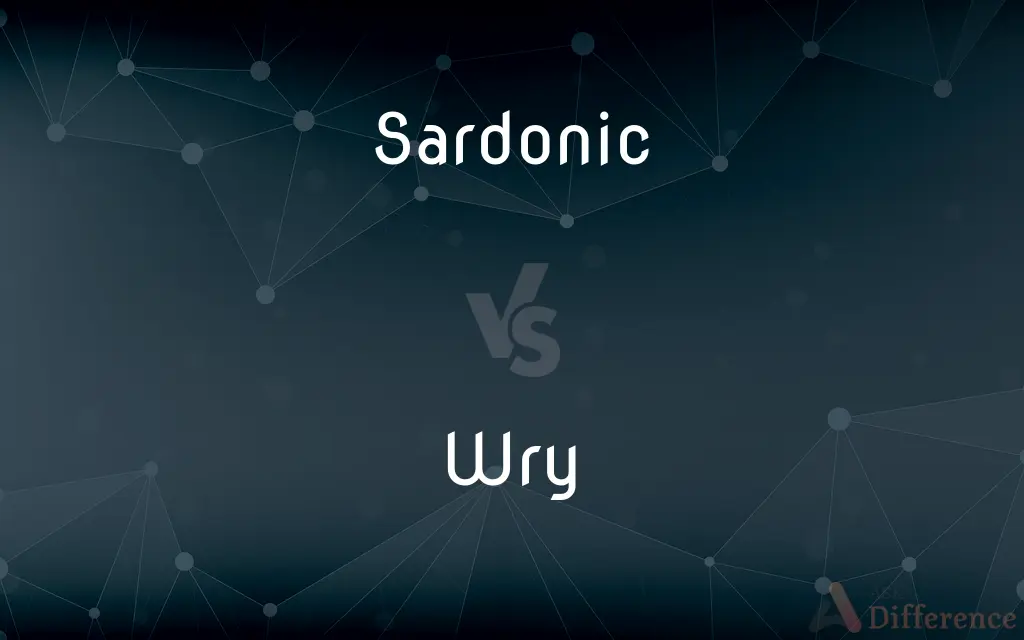Sardonic vs. Wry — What's the Difference?
By Tayyaba Rehman & Maham Liaqat — Updated on April 22, 2024
Sardonic humor displays scorn or cynicism, often with a mocking tone; wry humor is subtly mocking but with a milder, more ironic expression.

Difference Between Sardonic and Wry
Table of Contents
ADVERTISEMENT
Key Differences
Sardonic humor involves a biting, sharply mocking tone that often conveys disdain or skepticism, reflecting a darker aspect of humor. Whereas, wry humor is characterized by a dry, subtly ironic style that typically conveys amusement or irony without overt scorn.
People using sardonic expressions may seem more cynical or even contemptuous, suggesting a deeper dissatisfaction or disillusionment. On the other hand, those employing wry humor often appear more thoughtful or reflective, using understatement or an incongruity that is less harsh.
Sardonic humor can be more direct and harsh, making it suitable for situations where blunt, critical commentary is intended. In contrast, wry humor tends to be more indirect and gentle, often relaying criticism or personal insights with a light-hearted touch.
The facial expressions associated with sardonic humor might include sneers or grimaces, highlighting its scornful nature. Conversely, wry humor often accompanies a slight smile or smirk, signaling amusement with a situation rather than outright contempt.
In literature and media, sardonic characters often are portrayed as more openly hostile or antagonistic, using their humor as a weapon. Whereas, characters that use wry humor are typically portrayed as more likable or sympathetic, providing commentary on absurdities without alienating others.
ADVERTISEMENT
Comparison Chart
Tone
Biting, scornful
Subtle, ironic
Expression
Mocking, often with disdain
Mildly mocking, without overt scorn
Suitability
Critical commentary, disillusionment
Light-hearted critique, personal insight
Facial Expression
Sneers, grimaces
Slight smile, smirk
Character portrayal
Hostile, antagonistic
Likable, sympathetic
Compare with Definitions
Sardonic
Reflecting contempt or mocking jollity.
The play’s villain delivers his lines with a sardonic wit.
Wry
Subtly mocking; cleverly humorous.
The novelist is known for her wry observations of suburban life.
Sardonic
Displaying scornful mockery or cynicism.
His sardonic comment during the meeting cut deeper than expected.
Wry
Characterized by a slight twist or distortion of meaning.
His speech was full of wry comments about the current policy.
Sardonic
Involving grim mocking or cynical sneering.
He has a sardonic sense of humor that not everyone appreciates.
Wry
Using or expressing dry, especially mocking, humor.
His wry remark lightened the otherwise tense conference.
Sardonic
Characterized by bitter or scornful derision.
She gave a sardonic laugh when she heard the proposal.
Wry
Showing both amusement and a degree of scorn.
She responded with a wry smile to the absurd question.
Sardonic
Expressing disdain or skepticism through irony.
Her sardonic smile made it clear she doubted my explanation.
Wry
Indirectly humorous, often with ironic undertones.
His wry sense of humor often goes unnoticed at first.
Sardonic
Scornfully or cynically mocking
A sardonic sense of humor.
Wry
Using or expressing dry, especially mocking, humour
A wry smile
Wry comments
Sardonic
Given to making sardonic remarks
"He was proud, sardonic, harsh to inferiority of every description" (Charlotte Brontë).
Wry
(of a person's face or features) twisted into an expression of disgust, disappointment, or annoyance.
Sardonic
Scornfully mocking or cynical.
He distances himself from people with his nasty, sardonic laughter.
Wry
(of the neck or features) distorted or turned to one side
A remedy for wry necks
Sardonic
Disdainfully or ironically humorous.
Wry
Funny in an understated, sarcastic, or ironic way
A wry sense of humor.
Sardonic
Forced; unnatural; insincere; hence, derisive, mocking, malignant, or bitterly sarcastic; - applied only to a laugh, smile, or some facial semblance of gayety.
Where strained, sardonic smiles are glozing still,And grief is forced to laugh against her will.
The scornful, ferocious, sardonic grin of a bloody ruffian.
Wry
Temporarily twisted in an expression of distaste or displeasure
Made a wry face.
Sardonic
Of, pertaining to, or resembling, a kind of linen made at Colchis.
Wry
(Archaic) Abnormally twisted or bent to one side; crooked
A wry nose.
Sardonic
Disdainfully or ironically humorous; scornful and mocking;
His rebellion is the bitter, sardonic laughter of all great satirists
A wry pleasure to be...reminded of all that one is missing
Wry
Turned away, contorted (of the face or body).
Wry
Dryly humorous; sardonic or bitterly ironic.
Wry
Twisted, bent, crooked.
Wry
Deviating from the right direction; misdirected; out of place.
Wry
To turn (away); to swerve or deviate.
Wry
To divert; to cause to turn away.
Wry
(transitive) To twist or contort (the body, face, etc.).
Wry
To cover; clothe; cover up; cloak; hide.
Wry
(regional) Distortion.
Wry
To cover.
Wrie you in that mantle.
Wry
To twist; to writhe; to bend or wind.
Wry
To deviate from the right way; to go away or astray; to turn side; to swerve.
This Phebus gan awayward for to wryen.
How manyMust murder wives much better than themselvesFor wrying but a little!
Wry
To twist; to distort; to writhe; to wrest; to vex.
Guests by hundreds, not one caringIf the dear host's neck were wried.
Wry
Turned to one side; twisted; distorted; as, a wry mouth.
Wry
Hence, deviating from the right direction; misdirected; out of place; as, wry words.
Not according to the wry rigor of our neighbors, who never take up an old idea without some extravagance in its application.
Wry
Wrested; perverted.
He . . . puts a wry sense upon Protestant writers.
Wry
Humorously sarcastic or mocking;
Dry humor
An ironic remark often conveys an intended meaning obliquely
An ironic novel
An ironical smile
With a wry Scottish wit
Wry
Bent to one side;
A wry neck
Wry
Disdainfully or ironically humorous; scornful and mocking;
His rebellion is the bitter, sardonic laughter of all great satirists
A wry pleasure to be...reminded of all that one is missing
Common Curiosities
Can sardonic humor be considered offensive?
Yes, sardonic humor can be offensive due to its harsh tone.
Is wry humor more acceptable in formal settings?
Yes, wry humor, being subtler and less abrasive, is often more acceptable in formal settings.
What facial expression typically accompanies wry humor?
A slight smile or smirk often accompanies wry humor.
Can someone use both sardonic and wry humor effectively?
Yes, though they cater to different contexts and audiences.
What is a key difference in the intent behind sardonic and wry humor?
Sardonic humor aims to criticize or show contempt, while wry humor aims to amuse with a light critique.
What is the primary emotion behind sardonic humor?
Sardonic humor primarily conveys scorn or cynicism.
What facial expression is commonly associated with sardonic humor?
A sneer or grimace is commonly associated with sardonic humor.
Which type of humor is better for light-hearted banter?
Wry humor is more suited for light-hearted banter due to its gentle mockery.
How does wry humor typically present itself in conversation?
Wry humor typically appears as a subtle, dry wit.
How do audiences generally react to sardonic humor?
Audiences may react negatively if they perceive it as too cynical or harsh.
How does sardonic humor influence the portrayal of a character in literature?
It often makes characters appear more villainous or antagonistic.
How does wry humor influence the portrayal of a character in stories?
Characters using wry humor are often seen as more endearing and intelligent.
Is wry humor effective in diffusing tense situations?
Yes, its understated nature can help lighten moods without escalating tension.
What is the best context to use wry humor?
Wry humor works best in situations requiring a nuanced, insightful touch.
Can sardonic expressions impact interpersonal relationships?
Yes, overly sardonic attitudes can strain relationships.
Share Your Discovery

Previous Comparison
Attribute vs. Attitude
Next Comparison
Stipulate vs. DefineAuthor Spotlight
Written by
Tayyaba RehmanTayyaba Rehman is a distinguished writer, currently serving as a primary contributor to askdifference.com. As a researcher in semantics and etymology, Tayyaba's passion for the complexity of languages and their distinctions has found a perfect home on the platform. Tayyaba delves into the intricacies of language, distinguishing between commonly confused words and phrases, thereby providing clarity for readers worldwide.
Co-written by
Maham Liaqat















































